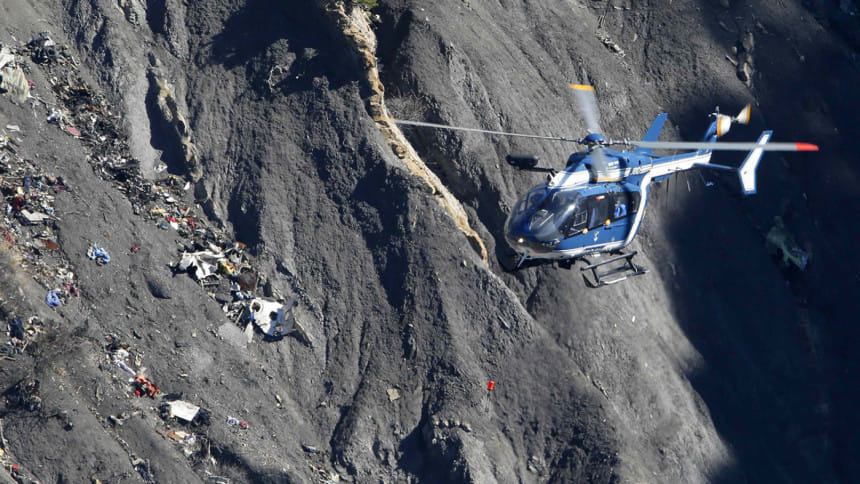Alps crash co-pilot 'hid illness'

Alps crash co-pilot Andreas Lubitz hid the details of an existing illness from his employers, German prosecutors say.
They said they had found torn-up sick notes in his homes, including one covering the day of the crash.
In their report, prosecutors in the city of Duesseldorf did not disclose the nature of Lubitz's illness.
German media have said internal aviation authority documents suggest he suffered depression and required ongoing assessment.
Prosecutors said there was no evidence of a political or religious motive for his actions and no suicide note was found.
Lubitz and 149 passengers and crew died when Germanwings flight 4U 9525 crashed in the French Alps on Tuesday.
Data from the plane's voice recorder suggest Lubitz purposely started an eight-minute descent into the mountains while the pilot was locked out of the cockpit.
In their statement (in German), the prosecutors said they had seized medical documents from Lubitz's two residences - his Duesseldorf flat and his parents' home north of Frankfurt - which indicated an "existing illness and appropriate medical treatment".

WHAT IS DEPRESSION?
Depression is more than just feeling a bit down for a few days. It is an illness which, at its most severe, can leave people feeling that life is no longer worth living. It can cause physical symptoms such as headaches, sleeplessness and constant tiredness which may last for months and months.
People with depression can also feel anxious, irritable and agitated on a daily basis but it affects everyone differently and only in rare cases is it a reason for violence against others.
If people admit their symptoms and talk to someone about their feelings, depression can usually be treated but the biggest barrier to getting help is often stigma and the fear of disclosing mental health problems.
The "fact that, among the documents found, there were sick notes - torn-up, current and for the day of the crash - leads to the provisional assessment that the deceased was hiding his illness from his employer", the report states.
Germanwings, a subsidiary of Lufthansa, refused to comment on the new information, the Associated Press news agency reports.
Andreas Lubitz
- Started training in 2008 at Bremen and in Arizona
- Worked as co-pilot, or first officer, from 2013. Appeared pleased with his job
- Lived in town of Montabaur, near Frankfurt, with his parents. Kept a flat in Duesseldorf
- Pilot training was interrupted for some months in 2009 when, German media report, he suffered a depressive episode requiring treatment. He later passed all tests and was deemed fit to fly
German media report that Lubitz's notes say he suffered a serious depressive episode when he finished training in 2009.
He went on to receive treatment for a year and a half, Bild newspaper says.
Internal documents quoted by Bild and German broadcaster ARD say a note on Lubitz's aviation authority file recommended regular psychological assessment.
Lubitz's employers have confirmed his training was interrupted for several months six years ago, without explaining why.
Lufthansa chief Carsten Spohr has insisted Lubitz was only able to resume training after his suitability was "re-established".
"He passed all the subsequent tests and checks with flying colours," Spohr was quoted as saying.
Recovery efforts are continuing at the crash site on the third day following the crash.
DNA SAMPLES
Investigators continue to comb the crash site for body parts, debris and the second "black box", which records flight data.
Family members of some of the passengers and crew who died have visited Seyne-les-Alpes, near the crash site.
They were accompanied by psychologists, paramedics and Red Cross workers, and a youth centre in the town was set up to receive them.
Families are providing DNA samples to allow for identification of victims' remains.
Many have now left the site but more relatives are expected over coming days, including loved ones of a Colombian victim.
Other incidents thought to be caused by deliberate pilot action
- 29 November 2013: A flight between Mozambique and Angola crashed in Namibia, killing 33 people. Initial investigation results suggested the accident was deliberately carried out by the captain shortly after the first officer (also known as the co-pilot) had left the flight deck.
- 31 October 1999: An EgyptAir Boeing 767 went into a rapid descent 30 minutes after taking off from New York, killing 217 people. An investigation suggested that the crash was caused deliberately by the relief first officer but the evidence was not conclusive.
- 19 December 1997: More than 100 people were killed when a Boeing 737 travelling from Indonesia to Singapore crashed. The pilot - suffering from "multiple work-related difficulties" - was suspected of switching off the flight recorders and intentionally putting the plane into a dive.

 For all latest news, follow The Daily Star's Google News channel.
For all latest news, follow The Daily Star's Google News channel. 



Comments